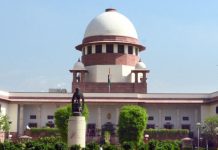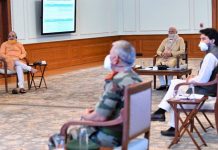Despite being mired in a number of controversies, former PM Imran Khan has emerged as a political icon in Pakistan. It is feared that his arrest, which could take place any moment, can trigger countrywide agitation against the government and the army, writes Gopal Misra
Imran Khan, a former cricketer-turned politician, who had served as the country’s PM for more than three years, could be arrested any moment, but he has his shown rare grit in passion and perseverance, while seeking for long-term and meaningful political goals in the deeply divided Pakistan.
For the past several days, Khan’s supporters are resisting Khan’s arrest in Lahore on the pleas that that their leader is being implicated in false cases; and he has augmented their logic by stating that the conspiracy regarding his arrest was being hatched in London, thus implicating Nawaz Sharif, a former PM exiled in London.
Khan, who is credited for winning the cricket World Club for Pakistan in 1992 under his captaincy, is expected to repeat this time his political victory in the country’s murky political cesspool. In spite of being mired in a number of controversies, including being accused of selling the gifts received from foreign dignitaries, he has emerged as the most popular political icon in Pakistan.
He was once a favourite of the GHQ, Rawalpindi, and was groomed for the country’s top civilian position of a PM for a prolonged 10 years till he was elevated. He, however, lost the favour of the then army chief, Qamar Jawed Bajwa, and was thus finally ousted in the by passing the no-confidence resolution with the help of the GHQ in the National Assembly. An irate Khan has never forgiven Bajwa for ‘hatching conspiracy’ against him, and he has successfully enlisted a large number of his supporters among the higher echelons of army and its intelligence wing, ISI or Inter-Services Intelligence as well as from the retired army generals.
The ouster of the Khan government during March-April 2022 was quite dramatic and full of intrigues. The new incumbent, Shahbaz Sharif, who assumed power in spite of the adverse advice from his brother, Nawaz Sharif, has been in a state of decision paralysis and is struggling to find his feet, while Khan has been leading rallies across the country attacking the government’s legitimacy and calling for fresh elections. His rallies have been adversely affecting the country’s fragile economy too.
It is apprehended that with his arrest, which could take place any moment, Khan migh usher in a countrywide agitation against the present government and even its army. He, however, is expected to further gain popularity among youths. The presence of a large number of youths and the support of former senior army officers makes Khan much more assertive before the law enforcing agencies as well as the higher judiciary.
The Indian Apprehension
The ongoing internal economic and political crisis, according to Indian experts on strategic affairs, is that the millions of starving people across western borders has caused concerns in India, and it is considered worst than the 1971 East Pakistan turmoil, which had led to the birth of Bangladesh. Bangladesh was conceived as a nation, rejecting the two-nation theory that Hindus and Muslims are separate nations.
Pakistan’s political leadership irrespective of their political affiliations, seek India’s all possible help for reviving its economy, but do not hesitate to boast that once they regain financial health, they would take on India later, cautions Sushant Sareen, a well-known commentator on strategic affairs.
It is being discussed in New Delhi’s various forums that it will be a fatal mistake to consider the Pakistani crisis like that of Bangladesh. On the other hand, GHQ at Rawalpindi, may use it as a new opportunity to conspire against India under the garb of starving refugees. It can push thousands of radicalized Muslim youth at its choice, who are just ready cross the borders to invade India, if the situation on the food front continues to be grim.
Notice to Pakistan
India has issued a 90-day notice on Janaury 27, 2023, to Islamabad seeking modification of the more than six-decade-old Indus Water Treaty (IWT) that governs the sharing of waters of six rivers in the Indus system between the two countries. New Delhi has stated that the notice follows Pakistan’s continued “intransigence” in implementing the treaty, by raising repeated objections to the construction of hydro-electric projects on the Indian side. However, the ongoing political crisis has eclipsed this issue for a while.
There are many reasons being assigned for the rift between Khan and the military. They had been previously functioning on a much-touted “same page.” Apart from the biggest controversy regarding an impasse over the transfer of the director general of the Inter Services Intelligence (ISI) in October 2021, the Khan government could not get the constitutional provision removed depriving the provincial share in the federal revenue collections. The army wanted that the provincial funds should be made available to it before the provinces get the substantial funds for education and health.
Another ‘unpardonable’ act of Khan wa refusal to sign off on the ISI’s director general’s transfer, already approved by the military, for weeks. The then-ISI chief, Faize Hamid, was a Khan loyalist, and it was speculated that Khan wanted him to be around for the next election (or perhaps even to appoint him the next army chief).
Once Khan lost the military’s support, it enabled the opposition to make their moves. Two small parties allied with Khan in the ruling coalition switched to the opposition, enough to deprive him of his razor-thin majority in the National Assembly.
THE Unstable Coalition
Since its inception in 2022, the new government, led by the PML-N’s Shahbaz Sharif, has been facing formidable challenges — and not just from Khan, but other economic and religious challenges. Shahbaz’s brother, Nawaz Sharif, who was deposed in 2017 on corruption charges and now lives in London, still exercises control over the party, and indeed the government.
It cannot be stated that the general elections would resolve the ongoing political crisis amidst the economic woes. While Khan appears to be ready to trounce his political rivals, the Shahbaz-led coalition is just like a sitting lamb to be chopped off by a butcher anytime. Khan had tried to hold polls before being ousted, but the Supreme Court foiled his attempt and allowed the Shabaz –led coalition to replace his government.
With the army’s decision to keep off from active politics, the situation in the country remains fragile. Meanwhile, there are reports that one of the major coalition partners, Asif Ali Zardari of Pakistan’ Peoples’ Party, is not keen for early polls. Meanwhile, he has reportedly asked his young son, Bliawal, country’s foreign minister at present, to win the confidence of the GHQ at Rawalpindi to be considered as a future PM. It means, that the coalition partners will be fighting separately in the polls, thus improving the chances of Khan and his party.
Presently, Pakistan’s ongoing political upheaval is just an opportunistic struggle for power. The people continue to watch the country’s plight helplessly. The three main players in the country’s power struggle are the ruling coalition, the opposition party, PTI, and the army. The ordinary Pakistanis are just at the receiving end. Its leaders and security forces are decamping with their precious wealth to foreign shores with a vengeance.













